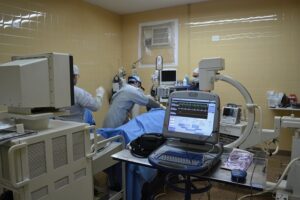Managing ARDS-Related Anxiety in ICU Patients
Managing ARDS-Related Anxiety in ICU Patients
Acute Respiratory Distress Syndrome (ARDS) is a severe condition that affects the lungs and is commonly seen in intensive care settings. The diagnosis and treatment of ARDS not only present medical challenges but also cast a long shadow of psychological distress over patients and their families. Managing anxiety related to ARDS requires a multifaceted approach, as the experience in the Intensive Care Unit (ICU) can be overwhelming and frightening. This article explores practical strategies for managing ARDS-related anxiety, emphasizing the principles that healthcare providers, patients, and families need to understand.
Understanding ARDS and Its Psychological Impact
ARDS is characterized by sudden and widespread inflammation in the lungs, leading to severe respiratory failure. Patients often require mechanical ventilation and intensive medical management. The sudden onset of this condition can leave patients feeling exposed, afraid, and helpless, intensifying feelings of anxiety. Within the ICU environment, the combination of invasive treatments, noise, and the presence of multiple healthcare providers can contribute to an atmosphere filled with distress.
The psychological impact of ARDS is crucial for both the patient and the family. Emotional responses can range from fear and uncertainty to panic and depression. This mental turmoil can affect recovery trajectories and complicate the fight against physical symptoms. Understanding the emotional aspects of ARDS is essential for addressing the entire spectrum of care, leading to better outcomes and a more compassionate environment.
- Behavioral changes such as withdrawal, irritability, or restlessness.
- Occurrence of nightmares or flashbacks related to the ICU experience.
- Difficulty processing the emotional impact of being critically ill.
Importance of Open Communication
Open and transparent communication between healthcare providers, patients, and their families plays a crucial role in managing anxiety associated with ARDS. When patients are informed about their condition, treatment plan, and what to expect, they often feel more in control and less anxious. Providing information can demystify the experience and diminish feelings of vulnerability.
Encouraging questions from both patients and their families can facilitate a supportive environment. Care teams should be trained to communicate effectively and compassionately, addressing concerns while providing reassurance.
- Implement scheduled updates between care teams and families.
- Hold family meetings to address collective concerns and expectations.
- Utilize visual aids to explain medical procedures and equipment.
Creating a Calming ICU Environment
The ICU environment can be alarmingly bright, noisy, and sterile, which can exacerbate anxiety. Measures can be taken to create a more calming atmosphere. Simple adjustments—like minimizing noise levels, dimming lights during the night, and providing personal items such as photos or other familiar objects—can ease feelings of distress.
Consideration of patient-centered design principles can lead to an atmosphere that feels less like a hospital and more like a healing space. Caregivers should also be mindful of how their body language and demeanor can either alleviate or amplify a patient’s anxiety.
- Incorporate soothing colors and natural elements into the ICU design.
- Allow patients to listen to calming music or sounds.
- Encourage visitors who can provide emotional support.
Utilizing Relaxation Techniques
Relaxation techniques can be positively impactful in reducing anxiety among ICU patients diagnosed with ARDS. Options like guided imagery, deep breathing exercises, and progressive muscle relaxation can help patients regain a sense of control. Simple breathing techniques can help patients manage their anxiety autonomously, enabling them to focus on their recovery.
Training healthcare professionals to offer relaxation techniques can further empower patients as they navigate their ICU experience. Incorporating these methods into daily care routines can maximize their effectiveness.
- Teach diaphragmatic or “belly” breathing techniques.
- Implement quiet time during which no medical procedures occur.
- Offer guided meditations via audio or videos.
Involving Family Members in Care
The involvement of family members can offer an additional layer of emotional support to ARDS patients. Family members can serve as advocates and provide essential comfort, often helping to ease anxiety. Family presence in the ICU has been associated with improved satisfaction and emotional well-being for both parties.
Educational sessions for family members can also help them understand what the patient is going through physically and psychologically. This equips family members to provide informed support, reducing their own stress while aiding the patient’s emotional resilience.
- Encourage family members to maintain physical contact with the patient.
- Facilitate family-led conversations about shared experiences.
- Encourage families to engage in supportive dialogue about feelings and fears.
Utilizing Mental Health Resources
Emerging studies highlight the importance of integrating mental health professionals into the ICU care team. Providing access to psychological support can be invaluable for managing ARDS-related anxiety. Therapeutic interventions can range from cognitive-behavioral therapy (CBT) to counseling sessions focused on coping strategies.
Exploring psychiatric evaluations for long-term psychological impact can assist in identifying patients who may require sustained support after discharge. By addressing mental health needs alongside medical care, patients can achieve a holistic approach to recovery.
- Incorporate licensed mental health professionals into the care team.
- Utilize telehealth options for ongoing mental health support.
- Create tailored mental health programs that address post-ICU syndrome.
Education on ARDS and Its Aftermath
Providing educational resources to both patients and families about ARDS, its management, and recovery can empower them. Knowledge serves as a protective factor against anxiety, leading to better coping strategies. Educational resources should cover extensive information, explaining what ARDS is, common treatment approaches, and potential long-term effects.
Digital resources—such as informative websites, webinars, and pamphlets—can supplement the educational process. Organizations dedicated to ARDS awareness often provide valuable insights and details on what to expect during recovery.
- Distribute brochures that outline ARDS and its treatment plans.
- Provide access to patient testimonials and recovery stories.
- Encourage participation in support groups for patients and families.
Recognizing the Importance of Self-Care
Though self-care may feel distant for patients within the confines of an ICU, promoting even small acts within their capacity can enhance their sense of control and well-being. Engaging in self-care techniques, even while bedridden, can pivot the focus from illness to empowerment.
Healthcare providers should encourage patients to engage in self-care practices such as journaling or expressing gratitude, both of which can foster psychological resilience. Through demonstrating small acts of independence, patients may feel a renewed sense of agency over their bodies and circumstances.
- Encourage journaling as a therapeutic exercise to track thoughts and feelings.
- Facilitate discussions about things for which patients feel grateful.
- Promote gentle movement if safe and appropriate.
FAQs about Managing ARDS-Related Anxiety
Q: What are the common symptoms of anxiety in ARDS patients?
A: Patients with ARDS may experience symptoms such as increased heart rate, shortness of breath, feelings of dread, irritability, and difficulty concentrating.
Q: How can family members assist in reducing a patient’s anxiety?
A: Family members can offer emotional support by being present with the patient, engaging in soothing conversations, and maintaining physical contact if allowed.
Q: Are relaxation techniques effective for ICU patients?
A: Yes, relaxation techniques, including deep breathing and guided imagery, can help decrease levels of anxiety, promoting emotional well-being.
Conclusion
Managing ARDS-related anxiety is crucial for both patients and their families. The complexities of ARDS demand a holistic approach that addresses both the medical and psychological dimensions of care. By fostering a supportive environment, promoting open communication, integrating mental health resources, and encouraging family involvement, we can alleviate the mental burdens placed upon those facing this distressing condition. As healthcare providers and advocates, it is our duty and privilege to arm patients and families with the tools they need to navigate the challenging landscape of ARDS, ultimately leading to more effective treatment and healing outcomes.
References
1. Ranieri, V. M., et al. (2012). “Acute Respiratory Distress Syndrome: The Berlin Definition.” JAMA, 307(23), 2526–2533. DOI: 10.1001/jama.2012.171
2. Chlan, L., et al. (2013). “Effects of Music on Sedation and Anxiety in Patients with Acute Respiratory Distress Syndrome.” Critical Care Medicine, 41(5), 1230-1238. DOI: 10.1097/CCM.0b013e31827e4364
3. Needham, D. M., et al. (2012). “Post-Intensive Care Syndrome: Actions for Physical and Occupational Therapy.” Physical Therapy, 92(4), 560–569. DOI: 10.2522/ptj.20120259
4. Krewulak, K. D., et al. (2012). “The Psychological Impact of Critical Illness.” International Journal of Critical Illness and Injury Science, 2(4), 297-301. DOI: 10.4103/2229-5151.106615
5. Acute Respiratory Distress Syndrome (ARDS) Foundation. (n.d.). Retrieved from ardsfoundation.org
About ARDS and Post-ARDS
ARDS (Acute Respiratory Distress Syndrome) is a life-threatening condition typically treated in an Intensive Care Unit (ICU). While ARDS itself is addressed during the ICU stay, recovery doesn’t end with discharge; patients then embark on a journey of healing from the effects of having had ARDS.
Disclaimer
The information provided in ARDS Alliance articles is for general informational and educational purposes only and is not a substitute for professional medical advice, diagnosis, or treatment. While we strive to present accurate, current information, the field of Acute Respiratory Distress Syndrome (ARDS) and related healthcare practices evolve rapidly, and ARDS Alliance makes no guarantee regarding the completeness, reliability, or suitability of the content.
Always seek the advice of qualified healthcare professionals with any questions you may have regarding a medical condition. Never disregard professional medical advice or delay seeking it because of information you read in ARDS Alliance articles. ARDS Alliance, its authors, contributors, and partners are not liable for any decision made or action taken based on the information provided in these articles.
About ARDS Alliance
Our mission is to improve the quality of life for ALL those affected by ARDS.
The ARDS Alliance is a non-profit committed to raising awareness and enhancing the understanding of Acute Respiratory Distress Syndrome (ARDS), a severe lung condition often occurring in critically ill patients. Through developing alliances, it unites various organizations and experts striving to improve care and support research aimed at finding more effective treatments. Their efforts include educating the public and healthcare providers about ARDS symptoms, risk factors, and advancements in treatment, ensuring better patient outcomes and resource availability.

I am dedicated to advancing research and education about Acute Respiratory Distress Syndrome. Our mission is to improve outcomes for patients and their families by providing support and resources for healthcare professionals. Together, we can make a difference in the lives of those affected by ARDS.
~ Paula Blonski
President, ARDS Alliance





